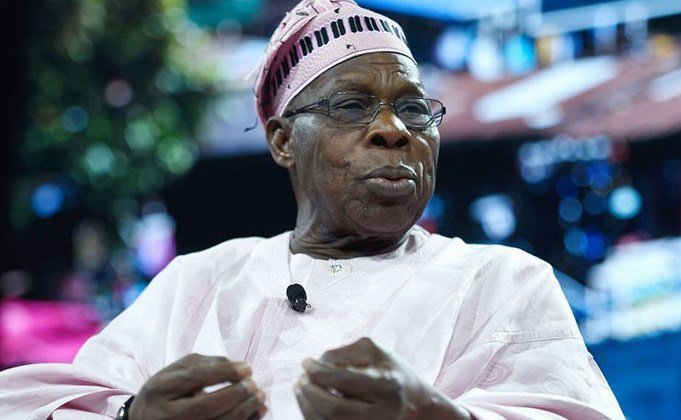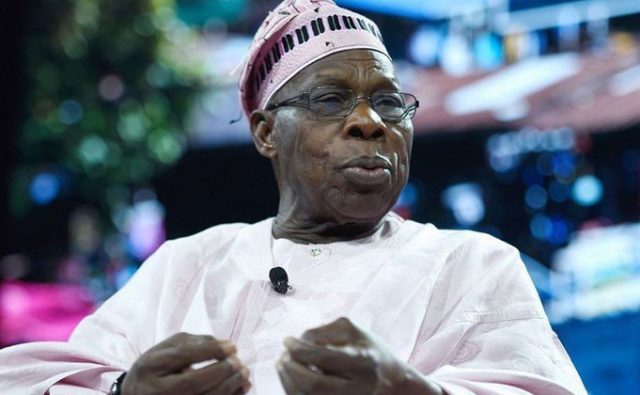 Former President Olusegun Obasanjo has branded the aim of the terror sect Boko Haram as ‘Fulanisation’ of West Africa and Islamisation of Africa.
Former President Olusegun Obasanjo has branded the aim of the terror sect Boko Haram as ‘Fulanisation’ of West Africa and Islamisation of Africa.
He urged an immediate and more aggressive approach by the federal government to deal with the current challenge of insecurity across the country brought about by the sect and its allies in ISIS.
He spoke as a study emerged on how the Islamic State West Africa Province (ISWAP), is allegedly trying to form a ‘jihadist proto-state’ in northern Nigeria.
Obasanjo, in a keynote address at the 2019 Synod of the Church of Nigeria (Anglican Communion), held in Oleh, Isoko South council area of Delta State said government should seek the opinions of all Nigerians that matter on the security situation and then proceed to bilateral, multinational, regional, continental and global levels for assistance in making the country safe for all.
“With ISIS involvement, we cannot but go global,” he said.
He spoke on the topic ‘Mobilizing Nigeria’s human and natural resources for national development and stability.’
Tracing the origin of the security threat to the Boko Haram insurgency and cattle rustling in the north, Obasanjo said: “They have both incubated and developed beyond what Nigeria can handle alone. They are now combined and internationalized with ISIS in control.
“It is no longer an issue of lack of education and lack of employment for our youths in Nigeria which it began as, it is now West African fulanization, African Islamization and global organized crimes of human trafficking, money laundering, drug trafficking, gun trafficking, illegal mining and regime change.
“Yet, we could have dealt with both earlier, and nip them in the bud, but Boko Haram boys were seen as rascals not requiring serious attention in administering holistic measures of stick and carrot.
“And when we woke up to the reality, it was turned to industry for all and sundry to supply materials and equipment that were already outdated and that were not fit for active military purpose.
“Soldiers were poorly trained for the unusual mission, poorly equipped, poorly motivated, poorly led and made to engage in propaganda rather than achieving results.
“Intelligence was poor and governments embarked on games of denials while paying ransoms which strengthened the insurgents and yet governments denied payments of ransoms. Today, the insecurity issue has gone beyond the wit and capacity of Nigerian Government or even West African Governments.”
On how the problem could be tackled he said: “Government must appreciate where we are, summon each group that should make contributions one by one and subsequently collectively seek the way forward for all hands on deck and with the holistic approach of stick and carrot.
“There should be no sacred cow. Some of the groups that I will suggest to be contacted are: Traditional rulers, past heads of Service Chiefs (no matter how competent or incompetent they have been and how much they have contributed to the mess we are in), past heads of paramilitary or organizations, private sector, civil society , community leaders particularly in the most affected areas, present and past governors, present and past local government leaders, religious leaders, past heads of states, past Intelligence chiefs, past heads of Civil Service and relevant current and retired diplomats, members of opposition and any groups that may be deemed relevant.
“After we have found appropriate solution internally, we should move to bilateral, multinational, regional, continental and global levels. With ISIS involvement, we cannot but go global.
“Without security and predictable stability, our development, growth and progress are in period.
“Let me hasten to add that we must be at the appropriate seat at the table of international discourse, deliberations, agenda and action.”
Nigeria from independence, according to him, has always been in the forefront of any continental initiative, decision, action or programme.
He, therefore, could not understand why Nigeria should be “outside the African Continental Free Trade Zone Agreement when it automatically came into effect with twenty-two-nations’ ratification.”
He added:”a situation where almost 40% of our population are not equipped with education to be able to make meaningful, positive and rewarding contribution to development in this day and age is bad almost to the point of criminality.
“Education both in quantity and quality must be seen as the first pillar of our development after we have delivered on politics of unity in diversity in concrete and sustainable policies and actions.
“We need a revolution to deal with our great backwardness in literacy and popular education. I believe that a two-year preparation to send all children below ten years of age with two streams of 8am to 12.30pm and 1pm to 5.30pm with teachers taking on two streams, getting additional 25 to 30 per cent salary will break the back of illiteracy and set us on the path of education for all.
“Community leaders, traditional rulers and local government chairmen should be held responsible for any parents or guardians preventing their children and wards from going to school. I have heard it said in some quarters that if everybody goes to school, who will be the servants. My lord Bishop, I dare say that if everybody goes to school, we will have more competent, efficient, effective and better servants.”
Study: ISWA ‘forming Jihadist Proto-State’ in Nigeria
And from the International Crisis Group (ICG), a Brussels, Belgium based NGO committed to preventing and resolving deadly conflicts, came a study on how the Islamic State West Africa Province (ISWAP), a Boko Haram offshoot, is employing its “growing power and influence to establish a ‘jihadist proto-state’ in northern Nigeria.
It said: “Three years after Boko Haram broke apart [in 2016], one faction, the Islamic State in West Africa Province, is forming a proto-state in northern Nigeria.
“The crisis in north-eastern Nigeria is about more than the military balance of power, as underscored by the support ISWAP has won by creating a proto-state providing a measure of governance and services.
“ISWAP poses a particular challenge to the Lake Chad states because it represents more than aggressive fighters, rumbling pickups with mounted guns or proclamations of the caliphate’s rebirth. It is filling a gap left by decades of poor governance and neglect in the region. It has cultivated stronger ties with local residents than Boko Haram ever could by helping recover lost cattle, settling disputes over grazing and fishing rights, fending off rustlers, providing care to expectant mothers in rural areas, and imposing swift if terrible justice upon criminals, sometimes including when they are ISWAP members.
“ISWAP is often cruel and arbitrary, even with civilians whose support it ostensibly seeks to gain. But for now, in the eyes of many locals, what it has to offer is often better than what came before.”
The report also reported how SWAP is “expanding across Africa’s Sahel region as well, where jihadi groups like al-Qaeda have been affiliated with Latin American drug cartels seeking to move narcotics into Europe and beyond.”
Quoting Egypt’s state-run Ahram Online, it said: “The vast Sahel-Sahara region, which spans Mali, Niger, Algeria, Libya, Chad, Burkina Faso and Mauritania, has become home to such terrorist organizations as the Movement for Unity and Jihad in West Africa (MUJWA), Al-Qaeda in the Islamic Maghreb (AQIM), the Islamic State group (or Islamic State in the Greater Sahara, ISGS) and the Macina Liberation Front (MLF).
These groups have close and extensive relations inside Libya which have enabled them to obtain material and financial support across Libya’s southern borders, an area that has become one of their preying grounds for abducting migrants, human trafficking and arms smuggling.”
The ICG advised the federal government to “press its military offensive against the jihadists but also try undercutting their appeal by improving governance and public services.”
It added: “If the Lake Chad states hope to dislodge the group and prevent its expansion, they therefore will have to do more than challenge ISWAP in battle. To make inroads, authorities will need to demonstrate that they can fill gaps in governance and service provision in areas of weaker ISWAP influence.”
Source: The Nation NG








I agree with Obasanjo on this.